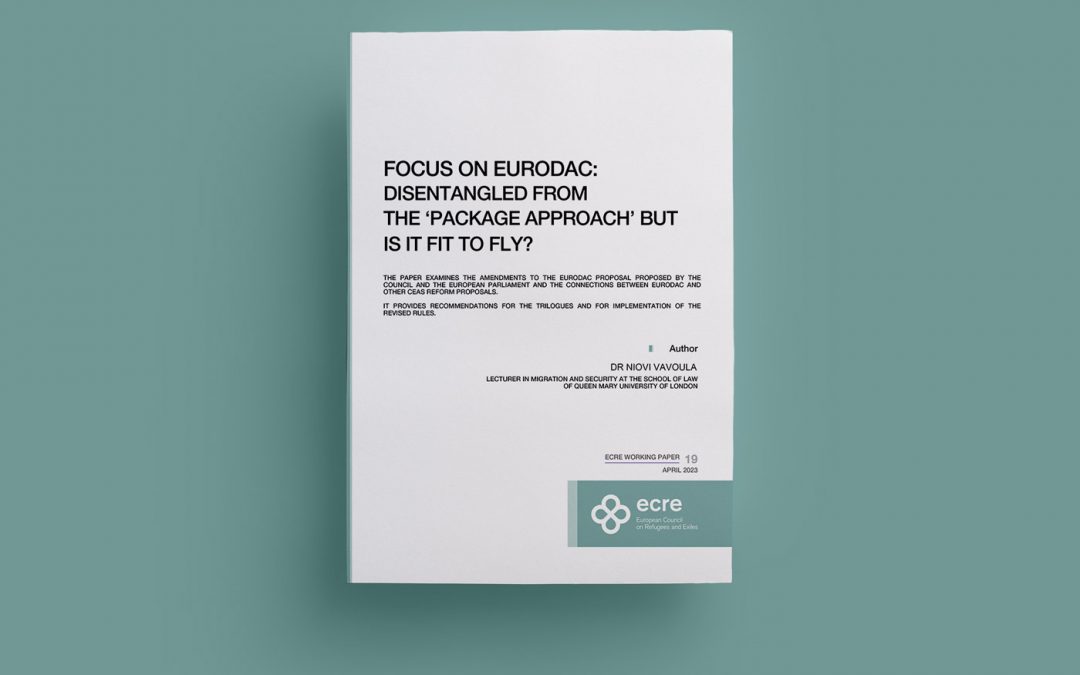This week ECRE published a working paper on Eurodac which examines the amendments to the Eurodac proposal proposed by the Council and the European Parliament and the connections between Eurodac and other CEAS reform proposals. The working paper also provides recommendations for the trilogues and for implementation of the revised rules. The working paper was written by Dr Niovi Vavoula, Lecturer in Migration and Security at the School of Law of Queen Mary University of London.
The paper focuses on the amended Eurodac proposal from 2020 which was put forward within the framework of the New Pact on Migration and Asylum. This working paper aims to position the Eurodac reforms alongside other proposals, including on screening and resettlement, and identify the extent to which Eurodac reform is connected to such proposals and how the adoption of revised Eurodac rules will have an impact on those proposals.
It provides concise overviews of the main amendments proposed by the Council and the European Parliament in their respective positions on the proposal. It then assesses their impact on fundamental rights, taking into account other factors such as the efficiency, effectiveness and fairness for member states. It explains where the two co-legislators converge and where it could be more difficult to reconcile their positions, bearing in mind the other legislative instruments under negotiation.
Convergence exist on the following issues: detecting unauthorised movements by counting individual applicants, leading to multiple registrations under different categories; the removal of references to screening and processing certain additional categories of personal data; boosting statistical data and consequential amendments relating to the forthcoming interoperability of large-scale IT systems.
There are multiple areas where positions differ such as Eurodac’s goals, where the European Parliament could insist on including the protection of children in the system’s objectives. Regarding statistical data, amendments proposed by the European Parliament are more focused on fundamental rights, including additional safeguards on the use of such statistical data. Importantly, many amendments proposed by the Council depend on whether Eurodac’s personal scope will be expanded to include beneficiaries of temporary protection and persons disembarked following a SAR operation. The scope of the system and classification of the individuals falling within its scope are likely to preoccupy the trilogues.
With regards to beneficiaries of temporary protection, the analysis in the working paper has demonstrated that expanding the scope to this category of people is inaccurately rooted in the relationship between Eurodac and the Temporary Protection Directive, even though the two legal instruments were never meant to interact. The necessity and proportionality of this amendment are contested. Distinguishing between maritime rescuees and other refugees is primarily intended to provide a better picture of migratory flows and enable better evidence-based policymaking. The differentiation of such persons is disproportionate to the objective pursued as it may result in different treatment in violation of the Refugee Convention.
The working paper includes recommendations for the trilogues and goes beyond that to consider an overall overhaul of the Eurodac rules to put forward recommendations for civil society and supervisory authorities regarding implementation of the revised rules.
For further information:
- ECRE Working Paper: Transforming Eurodac from 2016 to the New Pact: From the Dublin System’s Sidekick to a Database in Support of EU Policies on Asylum, Resettlement and Irregular Migration, January 2021

